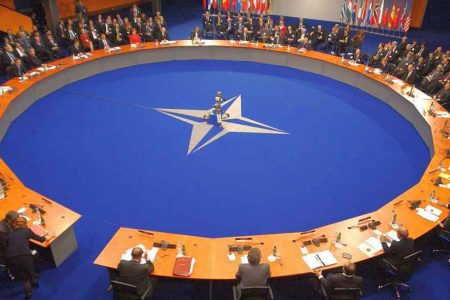EU and NATO member states are picked off one by one by Russia, potentially in conjunction with other entities, via information and political operations, in order to trigger the implosion of the EU and the subsequent isolation of core states – a source of money, innovation, and high end industrial and luxury products, but nothing more than an economic annex to a new world order centred on Asia.
THE STORY
Aug. 7 – SkyNews reported on “Eastern European Mafia” and “gun smuggling” from Romania, framing it in the context of “Britain’s security services warning of potential Paris-style terror attacks”, more recently favoured by “Islamist terror cells”.
Romanian authorities apprehended those pictured in the SkyNews report, releasing a statement according to which the group of alleged gun runners had been paid off by SkyNews to act out the entire scene in front of the cameras.
Since Romania is a pro-NATO and pro-EU oasis with zero terrorism incidents, where Christians (Protestant, Catholic and Orthodox), Muslims and Buddhists live in peace, one has to wonder how this came about.
WORKING HYPOTHESIS
Planting the seeds of doubt in the mind of the European public and discrediting an otherwise very stable partner in Europe’s South-East would serve several anti-European and anti-Western agendas.
CONTEXT
EU Summit in Bratislava 16 September
The EU heads of state and government were normally to talk about Brexit and the future of the Union. While Slovakian PM Robert Fico had set-out to talk about confidence building and a less bureaucratic Union, and the Council conclusions of June 29th had set-out an agenda about the economy, the more recent security related events are likely to derail the initial agenda. (Currently, the webpage of the summit places the reform of the Union at the centre of talks.) With the 14th of July attack in France and the compound Turkish problem (the July 15 coup and migration), the agenda is likely to shift towards the EU-NATO cooperation and the European Security Union.
Russian Legislative Elections 18 September
What’s at stake is a controlling majority in the Duma (the lower house of the Russian Parliament), with the United Russia Party – formerly headed by Mr. Putin – feeling uneasy given the post-2011 elections street protests and the more recently felt economic difficulties in Russia generated by the economic sanctions of the West.
EC vs. Poland
The European Union handed Poland, on July 27th, a three-month deadline to reverse changes to its constitutional court to meet EU concerns over the rule-of-law and democracy, or see its voting rights suspended in the European council of ministers.
While there is a matter at hand concerning the mentioned changes, from a broader perspective it would seem that the EC is more concerned with curing the disease than from saving the patient. This comes after several years of Bruxelles having less than ideal dealings with Hungary and Poland. It is possible to see how the war of rhetoric of the “Core vs. Periphery” will further aggravate and alienate populations within the European Union, further driving a wedge between parties at a time when the EU needs to pull together and not stand apart.
Anti-President Erdogan Attempted Coup in Turkey
The apparent attempted coup on July 15 in Turkey was enough to convince Mr. Erdogan that his true friend is in the Kremlin, as Russia had warned Mr. Erdogan ahead of the coup attempt. The aftermath drew Turkey apart from its Western partners, Mr. Erdogan making the coup attempt a problem of the whole of Turkey. There are some hints of blackmail in the most recent exchanges between Turkey and its NATO partners, weaponising migration and using the plight of migrants from Syria as a threat to the European Union.
Weapons bound for the Middle East
Reporting on European weapons sales to the Middle East are nothing new. A recent Guardian article depicts the situation objectively, showing that the recipients of such sales are some of the West’s staunchest partners in the region: Turkey, Jordan, the UAE and Saudi Arabia. It also shows how most of these weapons originated in Central and Eastern Europe more recently. Previously, similar journalistic reporting had uncovered how European weapons sales had originated from more western European countries, so we may draw the conclusion that what they are trying to point out is not that weapons exports from the EU exists, but that new countries joined the trade.
So we are in fact talking about two different stories, of which one seems to be a fake.
Info Ops
Guardian’s objective reporting comes in starch contrast to that of SkyNews which, throughout the text, keeps putting together terrorism, origins of weapons, migrants and DAESH, leaving the public believing that some member states of the Union might support (by inaction) the acquisition of weapons by the terrorists perpetrating the attacks at the heart of Europe.
It is no random choice that SkyNews releases this report: there are different types of publics consuming its products, reaching numerous households across society’s strata, both in Britain and abroad; it is also an international conglomerate, so the propagation force of SkyNews is considerably greater.
The generation of such a soundbite usually lingers in people’s minds, even if retracted. The psychological effects of it cannot be undone, and it creates the fundament of doubt necessary for future developments that may include weapons, terrorism, Eastern Europe, etc.
An example from the past would be the story of the creation of AIDS by the US and its subsequent purposeful spread of it; a contemporary version of this might be the notion that the US government is out to kill black citizens, a notion that emerged at some point in relation to the movement Black Lives Matter, an idea multiplied by so few news and research outlets that it was actually visible which of them were propaganda channels.
Europe is still being pronged on various subjects with the aim of finding its own triggers and Achilles’ heel(s).
THE ARGUMENTS
The white elephant in the room: the sanctions against Russia which, whether or not on the official agenda of any of the EU summits, continues to loom over meetings and to remind everyone the difference in political will between Core / EU6 and everybody else in the Union.
Over the next month, the EU and the West will need to tread carefully, September announcing itself to be a difficult electoral season in Russian politics, and that thanks mostly to Western sanctions which have taken their toll on the Russian economy. Russia needs to find an exit soon, and that exit is not about the EU’s sanctions, but about it finding enough ways to refuel its economy.
On the other hand, for some European countries, it is about regaining better relations with Moscow. Not least because Europe is not in a place currently to tackle the Russian problem (in relation to NATO, in relation to Ukraine, and in relation to energy and economic exchanges), the Turkish problem, the migration problem, the rising threat of DAESH in Africa, and its own economic fragility.
Of course, in an integrated and consolidated Europe in which problems would be solved collegially and not from adversarial positions, this would not be the case. Irrespective of what goes on internally, Europe should not transfer technical discussion from the Commission to the political level.
If the strategy of a foreign adversary was to divide Europe, so that the Core / EU6 keep being bled of funds and kept at odds with its discontent periphery, they would definitely be off to a good start.
We are also witnessing the inbuilt tensions between the need for economic strength and the need for security spending. The results of the banking sector stress test by the European Central Bank in July 2016 are not portraying an exceedingly positive picture throughout Europe. A first instinct, considered strictly from an economic point of view, would be to lift any sort of barriers to trade and economic development – Europe could not afford another financial crisis right now. At the same time, Europe can only be a credible international actor if it really stands its ground on the positions it takes vis-à-vis other international actors. That means no lifting of sanctions against Russia; that means it needs to think well about granting China Market Economy Status.
The EU needs to move quickly on several fronts. Greece has been worked into a corner by the European side, while Russia and China landed a hand; currently, Athens’ port is the last foot of the One Belt One Road system. It is unclear whether the Greek people feel stronger about the EU or about the One Belt One Road. Turkey is undergoing tremendous shocks through its society; unchecked and unchanged, this continuous regime of shocks will have the same transformational effect in Turkey as it did in Eastern Europe in the 1950s – the population will gradually forget about the mirage of Europe and will gain a certainty against Europe. Hungary had been backed into a corner, but the waters are calmer now; Poland is next with its notice from the Commission on the rule of law. Italy, squeezed between its banking sector and migration, will start expressing discontent soon enough.
Brexit is a chapter by itself. While many Britons are sorrow about the result of the vote, many are aggravated by the EU’s enthusiasm in negotiating openly with Scotland while it is still part of the UK, and at the same time giving the boot to England.
In this context, a news outlet from the “booted country” conveying a message about terrorism and immigration from the EU may not seem extraordinary to some Britons; to some continental Europeans as well. Particularly if it does so in relation to countries with a large diaspora in England – this time it was Romania, but it could have been any European country. There is a reason the Chunnel (Eurostar tunnel) and Calais are part of special agreements and security arrangements between France and the UK – nobody in the UK would want to see Belgian and French radicalised citizens travel to Britain to add to its already complex situation. For Romanians and other Europeans, England will always be part of Europe, and such reporting can only offend and create regret – hence all the stir the SkyNews reporting generated in Romania.
But things are a little more worrisome when we analyse how such reporting fits into several patterns related to information warfare:
- It feeds nationalist, independentism and isolationist attitudes in society
- It feeds the narrative of the threat coming from strangers (and other EU citizens)
- There is misuse of information and ideas to imply and associated notions that are not supported by evidence or truth
- It is bound to stir strong emotional response
Over the past few years several European countries have been picked off one by one. The major vulnerability vectors were:
- Democracy and rule of law – Turkey, Hungary, Poland
- Banking and Finance – Greece, Italy
- Cyberattacks – the Baltics
- Governance and the infallibility of government – Sweden, Germany
- Terrorism and security – France, Belgium, UK
Romania may not have been a champion of good governance, but had managed to remain a credible and stable security partner. In a South-Eastern front of Euro-scepticism, Romania had remained an unwavering supporter of the European idea and an important piece of the puzzle for NATO.
The fact that the SkyNews report picked Romania, out of all the nations with a large diaspora in England, to talk about security threats, coming from a country with no terrorism incidents, is odd to the point of going contrary to editorial common sense.
If Romania’s image were to be compromised in the eyes of the international public, Europe would end up with a continuous front from the Mediterranean to the Black Sea and to Vienna (Croatia excepted) of states equally favourable to Russia as to the EU; and equally unwilling to deal with the immigration situation, which is perceived as being triggered by a few core countries in particular.
CLOSING REMARKS & WARNINGS
Botched Journalism
IF this is a case of bad journalism, it is ok. Editorial mistakes can happen and there is only some shame in being set-up by active measures practitioners who needed their deed done by somebody else’s hand.
Disinformation
However, to have an entity from within the European family commit such acts of treachery deserves closer attention from EEAS’s (European External Action Service) Anti-Disinformation Service, alongside the attention warranted from UK investigators. For what could be more worrisome than the compromising of entities from within the Union and turning them against Member States?
Who’s Next?
Greece hasn’t fully recovered from its enmity towards the EU, while Turkey seems to have found new brotherhood in the arms of the Kremlin. And while Romania’s friend and neighbour, Bulgaria, is still considering the matter of the NATO Black Sea Fleet, the other neighbour, the EU-suspicious Kremlin-open Hungary, seems to not draw any unwanted attention to itself.
In this logic, Poland’s “execution” in two months’ time by the hand of the European Commission with charges related to the rule of law would be very unfortunate, practically collapsing the Eastern front of the Union.
While we’ve been worried about the Baltics for a while, we have not seen yet any concrete threat against them; nor has anything come up on the radar against Finland. Though Finland should expect asymmetric measures manifesting soon, as it has indicated an intent to closer cooperate with NATO.
For sure, things will become clearer once Ukraine and Russia settle, one way or another, the recent Crimea incident, and the subsequent amassing of Russian troops by the Ukrainian border.
The Costs
If this was just bad journalism, there need to be consequences.
If SkyNews was turned into an unwilling agent by anti-EU entities, then the EU needs to invest more into countering any further similar threats.
Any further similar action from within Europe will bring about the beginning of the end, in a sense. Bad political planning brought about Brexit (at an estimated cost of 75 bln. Pounds), which had quite a significant impact first and foremost on morale – of the citizens of the EU – and then also on the UK economy. While this SkyNews story will not shake Romanians’ confidence in their security structures, it will however further deepen the EU public’s lack of trust in our common institutions, in journalism, and in the notion of a “community of Europeans”. Bad or absent political planning for such contingencies cannot continue to be allowed to happen.
Security
What the whole situation boils down to is, in fact, security, democracy and stability being present in South-East Europe. Diminishing the willingness of the EU member states and of NATO to support the South-East may result, instead of having a stable region and a bridge-head to anchor the Middle-East and Asia flank of Europe, into having a wavering territory subject to the whims of international relations.
Unity
The upcoming European Summit in September needs to bring an opening of the EU towards working more politically with its members and to finding common solutions. The discussion does not need to be about moral relativism versus sanctions; whether talking about the excessive deficit procedure against Spain and Portugal, or about a variety of considerations in relation to countries in Central, Southern and Eastern Europe, new ways of reaching common objectives need to be brought to bear, so that Europe does not become an annex economic platform to other economic platforms.
Recommendations
While admirable that the EU wishes to hold itself to the highest economic governance standards, it is no less meritorious to act decisively in the interest of preserving the integrity of the Union and to safeguard each Member State. Europe is strong enough – both economically and militarily – to prioritize political entente and to develop a common front with regards to external pressures.
500 million EU citizens are asking for Statesmen and Stateswomen; they are asking them to think about the long term interests of Europeans, to communicate for all European citizens, and to speak up about the vision for Europe, and speak less about legislating their way there.
It is now, for the first time in sixty years, that true European scale leaders can rise to the challenge. Let us not forget that Europe was founded not only by Adenauer, Monnet and Schuman, but also by Churchill, Bech, Beyen, Gasperi, Spinelli, Hallstein, Mansholt, Spaak, and the peoples of the European Community.




